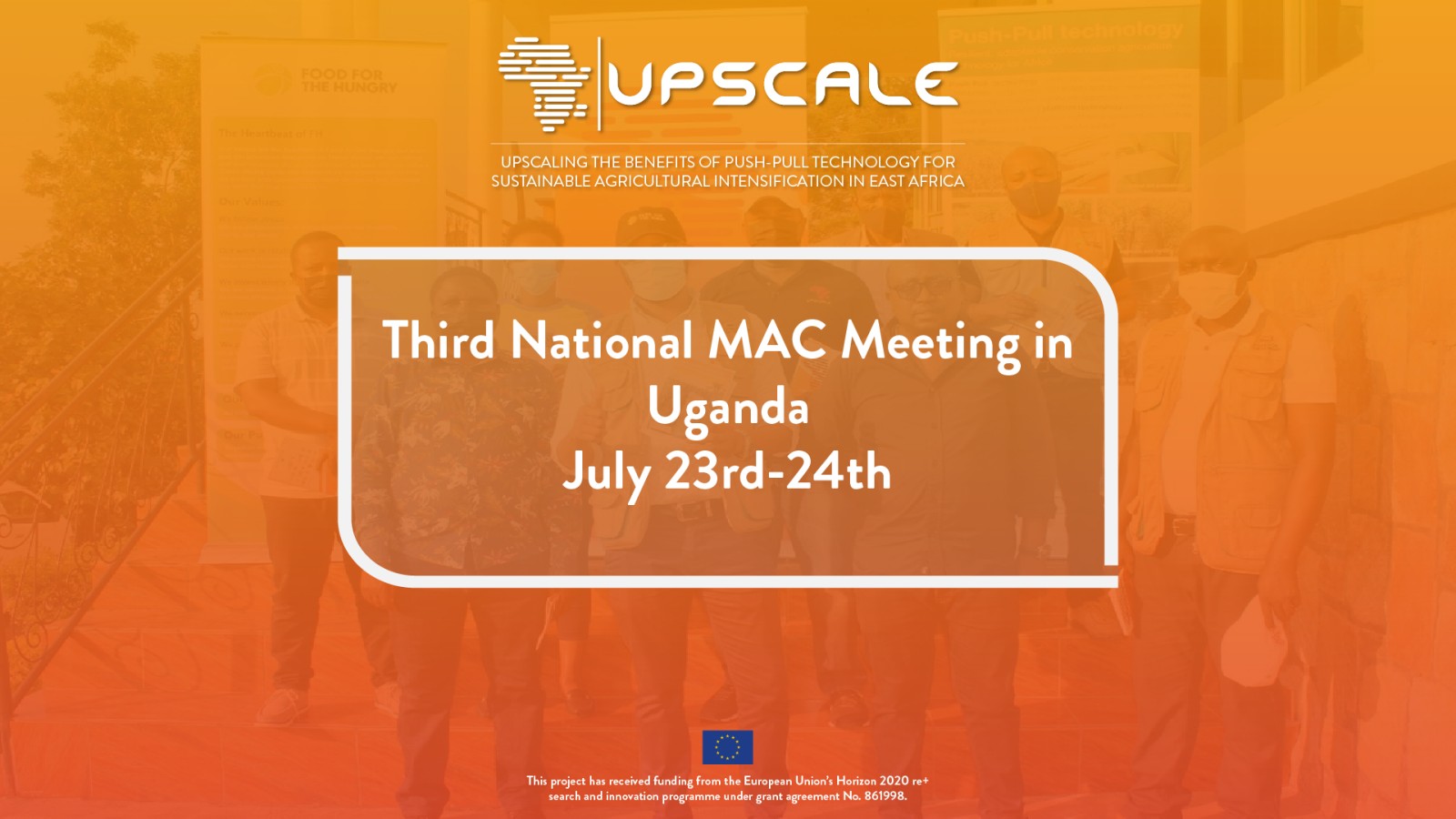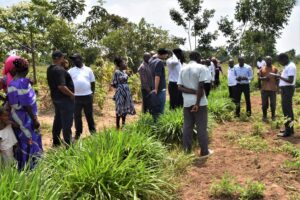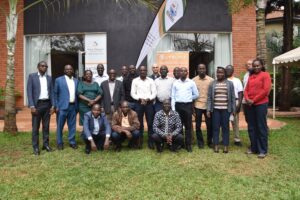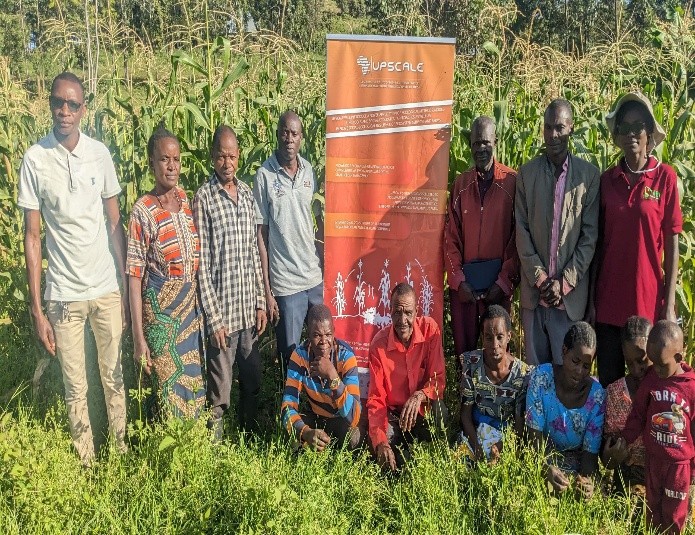Name of the event: The 3rd National MAC Meeting in Uganda and socio-ecological validation with stakeholders
Date: The Meeting took place from 22nd to 24th July 2024
Venue: The location of the meeting was Nile Village Hotel, Nalufenya, Jinja City, Uganda and it was hosted by NARO and LUND University. Twenty-nine participants attended the socio-ecological modelling workshop and Uganda country MAC meeting and comprised of MAC coordination team representing stakeholders from social sciences and humanities, academia, research and development, Ministry of Agriculture, media, local government, individual farmers, farmer groups and cooperatives, extension services, Agric-services provider, and Non-governmental Organizations (NGOs); project partners (Maseno University, University of Lund, and University of Giessen); and National Agricultural Research Organization (NARO).
The primary objective of the meeting was to synthesize knowledge for the targeted push-pull technology under a changing climate. Specifically, the event aimed to:
- Validate preliminary findings of the socio-ecological model.
- Review the progress of the UPSCALE project activities.
- Reflect on challenges and plan upcoming activities.
- Engage stakeholders in discussions to foster inclusiveness and accelerate the uptake of push-pull technologies.
Socio-ecological Model Validation Workshop
NARO and ULUND are organizing the UPSCALE model validation workshop due to take place on 22nd July 2024. The team is developing a model on the interaction of factors surrounding the push-pull ecosystem.
The model validation workshop, led by Dr Nikos Alexandridis from Lund University, focused on variables such as extension systems, intensification approaches, land under cereals production, fodder crops production, soil erosion, yield gaps, and agroforestry production. Key findings indicated positive interactions between increasing land under push-pull technology and fodder crop production, as well as reduced soil erosion.
Dr Nikos also highlighted perspective from a regional scale – the variables form a cyclic interaction with two sides that are interlinked. The first side is the farmer teachers bringing about extension inclusivity and later alone increasing agricultural intensification. The second side is the farmer teachers also weakly bringing about the integration of specialized extension services, which later alone led to increased agricultural intensification. Therefore, intensification is not related to farmer teachers and, limited resources (land, money to buy seed, etc.) increase intensification.
Multi-actor Communities of practice meeting
The MAC meeting, held on the 23rd and 24th of July, included presentations, discussions, and field excursions. Key sessions covered:
- Chairman’s Address: Stephen Magume, Chairman of Uganda MACs, highlighted the importance of new skills development and knowledge transfer to address agricultural challenges in Uganda, including climate change, pest and disease management, and demographic shifts. He was talking about approaches that combine skills development and technology transfer to embrace training on integrated pest management, conservation and precision agriculture; agricultural innovations platforms; farmer-led and private sector-led extension; digital extension and advisory services; mobile-based extension services; and experimental learning and hands-on training. In that manner, Stephen mentioned that the UPSCALE team did well on some approaches, but it would need to do more work on precision agriculture.
- Stakeholder Analysis and Country Scorecards: Led by Dr. Fredrick Aila from Maseno University, this session assessed the MACs’ activities, interest, impact, benefit ratings, and conflict ratings. The MACs participated in several activities including push-pull dissemination, farmer trainings, radio talks, etc.
Challenges and UPSCALE Responses
The main challenges that MAC participants are facing throughout the project are the following:
- High cost of Desmodium seed;
- Labour intensive comprising of PPT establishment and maintenance during the off-season;
- Competition from chemical pesticides with PPt because of the ease of availability, convenience and quick action;
- Open grazing of perennial push and pull plants during the dry season reduces the quality of these companion plants yet some community by-laws cannot protect the plants during the off-season;
- The low market for fodder from PPT products since many farmers lack animals;
- Traditional crop rotation with crops such as sweet potatoes requires the removal of Desmodium;
- PPT is not suitable for rent since it is perennial.
In order to overcome the listed challenges, the UPSCALE team is training stakeholders and farmers across the selected value chains of maize, Desmodium, Brachiaria, and vegetables on the commercial benefits of PPT products to offset the cost of seed thus making farming profitable. The project team also provides Desmodium and Brachiaria seeds for demonstration plots, which can later be planted vegetatively by community members, and promote community seed production.
Since the visibility of work is important in reaching a wider audience and potential PPT users, the UPSCALE team created awareness campaigns such as radio broadcasts, field days, dialogues, open exhibitions and on-farm demos. The promotion also included intensification of push-pull with high-value crops such as vegetables.
The 3rd National MAC Meeting in Uganda and the socio-ecological validation workshop successfully facilitated knowledge sharing, model validation, and strategic planning for the UPSCALE project. The event underscored the importance of transdisciplinary engagement and stakeholder involvement in promoting sustainable agricultural practices and the upscaling of push-pull technology in Eastern Africa.
-
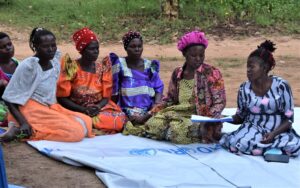
- Partcipating Push-pull farmers during Uganda MAC visit at Namundudi village, Nakalama sub county, Iganga district
-
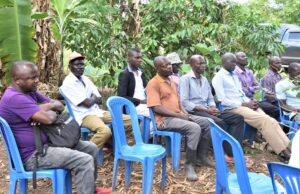
- Partcipating Push-pull farmers during Uganda MAC visit at Namundudi village, Nakalama sub county, Iganga district
-
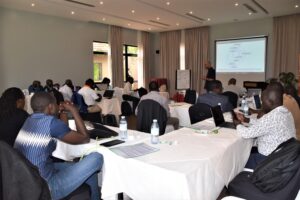
- Participants at the Socio-ecological model validation exercise held at Nile village hotel, Jinja city, Uganda

